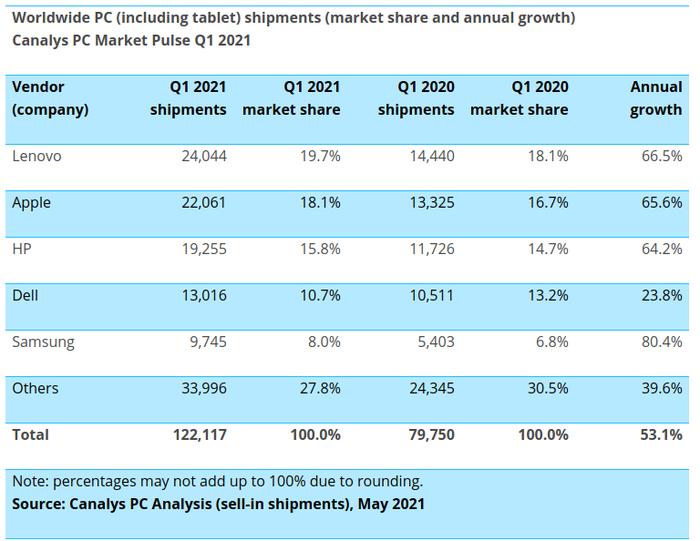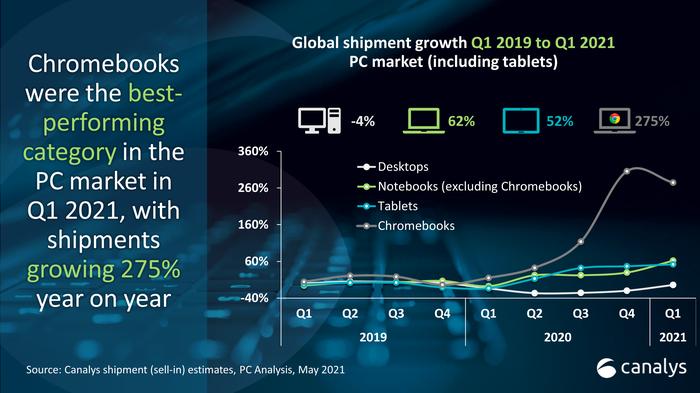Lenovo continues to lead global PC shipment tally
- 05 May, 2021 12:49

Lenovo continues to maintain its lead in the total global PC market, including desktops, notebooks and tablets, shipping 24 million units and posting year-on-year growth of 66.5 per cent in the three months ending 31 March.
Apple came second with 22.1 million shipments of Macs and iPads, while HP secured third place with 19.3 million units and 64.2 per cent growth, with Dell and Samsung making up the rest of the top five.
This is according to the latest data from industry analyst firm Canalys, which showed that the total worldwide PC market (including tablets) grew strongly for a fourth successive quarter, with shipments up 53.1 per cent year-on-year, to 122.1 million units.
 Credit: Canalys
Credit: Canalys Chromebooks and tablets continued to show strong growth as the market entered 2021, posting 274.6 per cent and 51.8 per cent growth and seeing first-quarter shipment volumes of 12 million and 39.7 million units respectively.
Chromebook vendors have posted record first-quarter shipment numbers, with HP topping the Chromebook market, with massive growth of 633.7 per cent propelling it past the 4-million-unit mark.
Lenovo, meanwhile, took second place in the Chromebook segment, with 3.1 million units shipped in the first quarter, after ramping up production to help ease order backlogs from 2020. Acer, Samsung and Dell made up the rest of the top five, all shipping over 1 million units.
“Chromebooks are well and truly a mainstream computing product now,” said Brian Lynch, Canalys research analyst. “While the education sector still accounts for the majority of shipments, their popularity with consumers and traditional commercial customers has reached new heights over the course of the last year.
“HP and Lenovo dominate the Chromebook market, but the boom has been a case of a rising tide lifting all boats, allowing vendors such as Acer and Samsung to carve out substantial shares within the PC market by catering specifically to Chromebook demand.
“Google is now in a strong position to work with its OEM partners and the channel to cement a rosy future for Chromebooks. A substantial messaging and evangelisation push coupled with the targeting of growth trends, such as flexible work arrangements and budget-conscious SMBs, will be vital to ensure the longevity of Chromebooks’ success,” he added.
 Credit: Canalys
Credit: Canalys At the same time, in the tablet segment, almost all the top vendors saw continued shipment growth in the first calendar quarter, with Apple extending its lead, growing by 50.3 per cent and shipping 15.2 million units as the latest iteration of the iPad Air gained traction with consumers.
Samsung maintained second place with 8 million units shipped, representing a year-on-year increase of 59.9per cent. However, Lenovo and Amazon enjoyed the highest levels of shipment volume growth, with 133.5 per cent and 197.9 per cent, year on year, respectively. This was primarily due to a low Q1 2020, Canalys suggested.
Chinese hardware maker Huawei bucked the trend, suffering a decline of 27.9 per cent, primarily due to the breakaway of its former Honor brand into a separate entity. However, the vendor still maintained a secure top-five spot with a healthy lead over competitors.
“The tablet market continues to defy expectations with the strength of its comeback,” Canalys research analyst Himani Mukka said. “Even beyond the traditionally strong holiday season, vendors are seeing elevated demand as the need for affordable computing power and connectivity persists.
"At a time when the overall PC market is facing a supply crunch, the vendors that have strong tablet offerings have been able to squeeze out even greater gains from the increased demand for screen access and remote productivity brought about by the pandemic.
“Canalys expects this trend to develop as tablets become mainstays in growing sectors such as education as well as in wider commercial deployments to support digital transformation,” Mukka added.
Fellow industry analyst firm IDC revealed figures last month that also pointed to substantial growth in the PC market during the first quarter, with the firm noting that the global traditional PC market shot up 55.2 per cent year-on-year during the quarter, with unfulfilled demand from last year driving the surge.
Consisting of desktops, notebooks and workstations -- and excluding tablets and x86 servers -- this saw the market reach 84 million shipments worldwide which, while up for the year, was down by 8 per cent from the fourth quarter.

